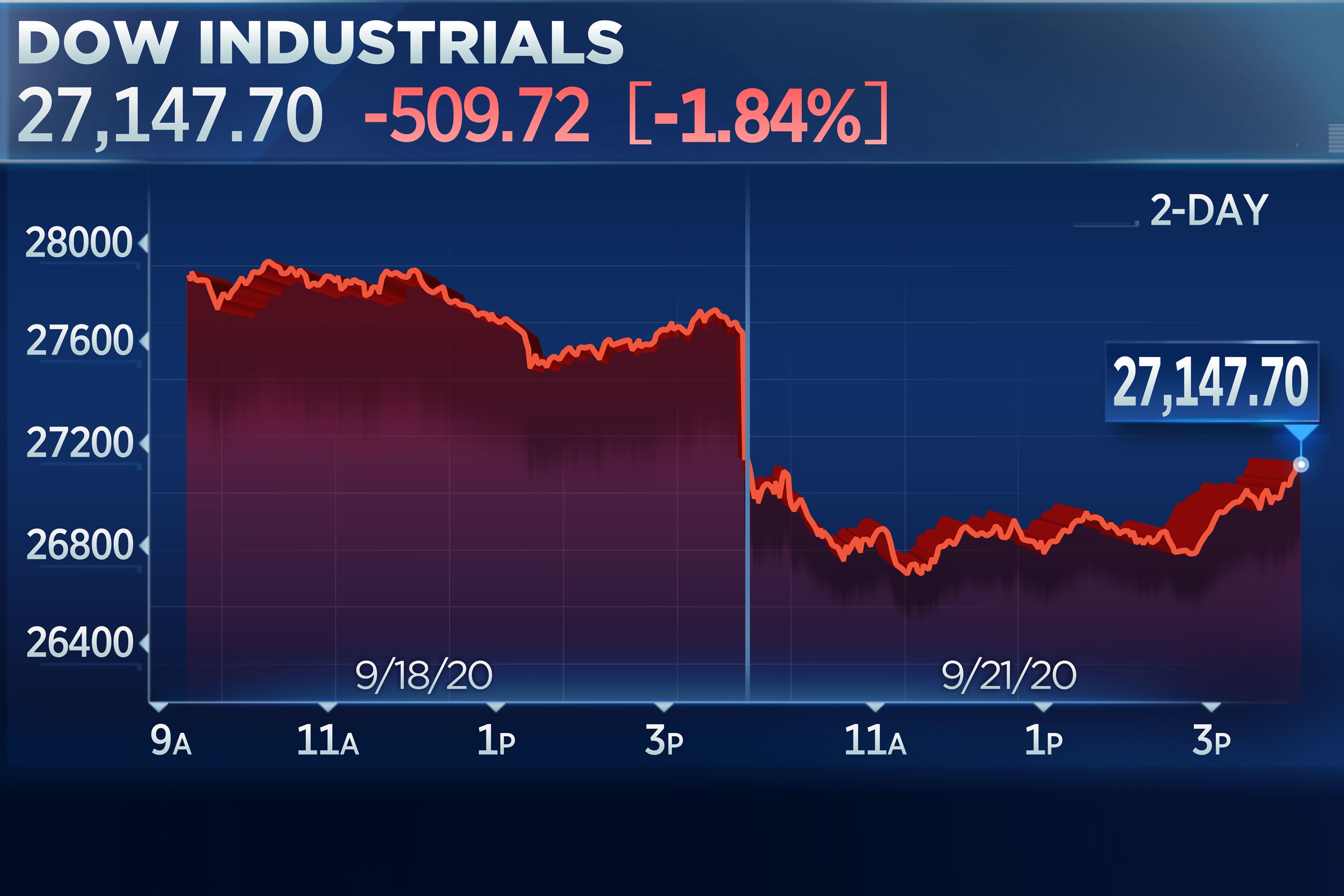Dow drops more than 500 points, S&P 500 posts first 4-day losing streak since February

Stocks fell on Monday as fears about the potential worsening of the coronavirus pandemic, as well as uncertainty on further U.S. fiscal stimulus, rattled traders.
The Dow Jones Industrial Average dropped 509.72 points, or 1.8%, to close at 27,147.70. The S&P 500 lost 1.2% to 3,281.06. The Nasdaq Composite closed just 0.1% lower at 10,778.80 after a late-day surge in tech stocks. At one point, the Dow had dropped more than 900 points. The S&P 500 fell as much as 2.7%.
Monday’s decline marked the first time since February that the S&P 500 posted four straight daily losses. The Dow, meanwhile, had its worst day since Sept. 8, when it dropped 2.3%.
These declines added to what has been a downbeat month on Wall Street. The S&P 500 is down more than 6% in September and the Dow has lost 4.5%. The Nasdaq Composite has tumbled 8.5% month to date.
Concerns over another wave of coronavirus cases came as the U.K. reportedly considers another national lockdown to stop an increase in infections. Top U.K. government scientists said that, without further action, the country’s infection rate could reach 50,000 per day. The country’s benchmark FTSE 100 dropped more than 3% on the fear. Here in the U.S., stocks that would be hit hardest from another lockdown declined. Shares of Carnival Corp. were off by 6.7%. Southwest Airlines and Delta Air Lines fell 5.8% and 9.2%, respectively.
“This is a health-care issue and we still really haven’t made any progress,” said Brad Kinkelaar, global portfolio manager at Barrow Hanley. “We still don’t have a vaccine; obviously, there’s still no cure and we’re still figuring out how to deal with the crisis.”
“So it’s not surprising we’ve gone from a market that was essentially pricing in a resumption of normal activity, within a reasonable time frame, to one pricing in the notion that we haven’t figured this out yet,” Kinkelaar said.
In Washington, negotiations for a new coronavirus stimulus bill could become more complicated after the passing of Supreme Court Justice Ruth Bader Ginsburg, which could lead to a bitter nomination process ahead of the election. President Donald Trump said he would nominate someone this week to take Ginsburg’s seat. Republicans and Democrats have been in a stalemate since July after provisions from the previous stimulus bill expired.
Chris Krueger, Washington strategist at Cowen, said in a note that a new coronavirus stimulus bill is now “unlikely until post-Nov. 3 as the fight over Justice Ginsburg’s empty seat will consume D.C.”
Bank stocks also contributed to the broader market drop after a report found that a number of global banks moved allegedly illicit funds. Shares of Deutsche Bank dropped 8.5%, while JPMorgan Chase fell 3.3%.
Meanwhile, tensions between the U.S. and China keep escalating. China’s Ministry of Commerce released long-awaited provisions on its so-called “unreliable entity list,” a day after the U.S. announced a ban on WeChat and TikTok.
Shares of General Motors fell 4.8% after Nikola founder Trevor Milton resigned from his post of executive chairman. Milton’s departure — which sent Nikola shares down 19.3% on Monday — comes after the two companies announced a partnership earlier this month.
Technology shares — which led the broader market off its coronavirus lows and into record territory, but have been hit hard so far in September — rebounded slightly. Shares of Apple rose 3% and Netflix gained 3.7%. Amazon eked out a small gain and Microsoft advanced 1.1%. Those stocks are still down sharply for the month, however.
“For the market to hold these levels buyers have to come into the technology sector over the next week to 10 days,” said Marc Chaikin, CEO of Chaikin Analytics, in a post. “Without the impetus of the call option buyers who helped propel the large-cap tech stocks to extreme valuations, it is unlikely that the subsequent rally can exceed the September peak.
The S&P 500, Dow Jones Industrial Average and Nasdaq Composite were coming off their third straight weekly drop, marking their longest weekly slide since 2019.
— CNBC’s Yun Li contributed reporting.
Subscribe to CNBC PRO for exclusive insights and analysis, and live business day programming from around the world.




